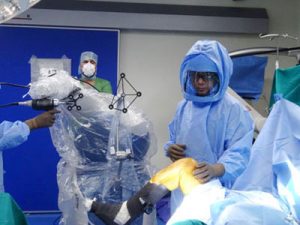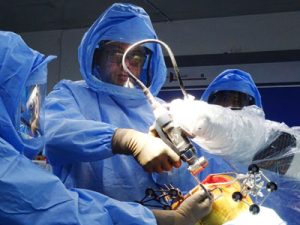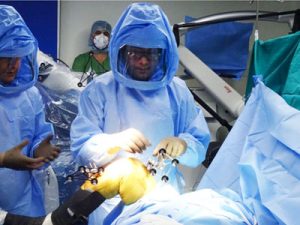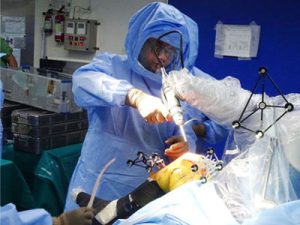Introduction to Mako Robotics in Knee Replacement Surgery
Knee replacement surgery has witnessed remarkable advancements over the years, with the emergence of innovative technologies enhancing surgical precision and patient outcomes. Among these advancements, Mako Robotics stands out as a revolutionary tool transforming the landscape of knee replacement procedures. In this article, we delve into the world of Mako Robotics and its impact on knee replacement surgeries in Mumbai.
Understanding the Evolution of Knee Replacement Techniques
Traditional knee replacement methods were predominant before the advent of robotic-assisted procedures. Conventional techniques lacked the precision and personalized approach now achievable through robotics. The evolution from traditional to robotic knee replacements has significantly improved surgical accuracy and patient recovery.
Advantages of Mako Robotics in Knee Replacement
Mako Robotics offers unparalleled precision, creating a customized surgical plan based on each patient's unique anatomy. Its minimally invasive approach reduces tissue damage and accelerates recovery. The technology's accuracy minimizes complications, ensuring long-term success post-surgery.
Applications of Mako Robotics in Knee Replacement Surgery
The versatility of Mako Robotics extends to both robotic total knee replacement and robotic partial knee replacement surgeries. Whether addressing the entire knee or specific compartments, the technology assists surgeons in executing precise and tailored procedures.
The Role of Surgeons in Mako Robotics Knee Replacement
Among the leading experts in this field is Dr. Amyn Rajani, whose proficiency and contributions have advanced robotic knee replacement surgery in Mumbai. His expertise in utilizing Mako Robotics has resulted in successful outcomes for numerous patients.
The Growing Popularity of Robotic Knee Replacement in Mumbai
Mumbai has witnessed a surge in the adoption of robotic knee replacement due to its superior outcomes. Patients seeking advanced surgical options increasingly opt for Mako Robotics-assisted procedures.
Choosing the Right Surgeon and Hospital for Mako Robotics Knee Replacement
Selecting a skilled robotic knee replacement surgeons in Mumbai and a reputable hospital equipped with Mako Robotics is crucial for a successful knee replacement journey. Factors such as experience, patient reviews, and facility infrastructure play pivotal roles in decision-making.
Preparing for Mako Robotics Knee Replacement Surgery
Patients undergoing Mako Robotics knee replacement undergo comprehensive evaluations and preparations preoperatively, ensuring a smooth surgical experience.
The Procedure of Mako Robotics Knee Replacement
The surgery involves a meticulous step-by-step process guided by the robotic system, ensuring precise bone preparation and implant positioning tailored to the patient's anatomy.




Recovery and Rehabilitation After Robotic Knee Replacement
Post-surgery, patients undergo a structured rehabilitation program, facilitating a quicker return to daily activities and promoting optimal joint function.
Addressing Concerns and Misconceptions About Mako Robotics Knee Replacement
Common misconceptions regarding robotic knee replacement, such as its affordability and accessibility, need clarification. Educating patients about its benefits can alleviate concerns.
Success Rates and Patient Satisfaction in Mako Robotics Knee Replacement
Statistics and patient testimonials showcase the high success rates and satisfaction levels achieved through Mako Robotics knee replacement surgeries.
Future Prospects and Innovations in Robotic Knee Replacement
The future of knee replacement surgery appears promising, with ongoing innovations aimed at enhancing robotic technology for better patient outcomes.
Conclusion
The integration of Mako Robotics in knee replacement surgery represents a monumental leap in medical innovation. Its precision, coupled with skilled surgeons like Dr. Amyn Rajani, has transformed the treatment landscape, offering patients effective solutions with improved outcomes.
FAQs
Is Mako Robotics knee replacement surgery only for severe cases?
Mako Robotics knee replacement surgery is not limited to severe cases alone. While it's effective for severe arthritis and complex cases, it's also suitable for less severe conditions. It offers precise and personalized treatment options for various degrees of knee joint damage, allowing for tailored surgical interventions that suit individual needs.
How long does the recovery period typically last after robotic knee replacement?
The recovery period after robotic knee replacement varies from person to person. Generally, patients can expect to start walking with assistance within a day or two after surgery. However, complete recovery and returning to normal activities might take several weeks to a few months. Physical therapy and rehabilitation play crucial roles in achieving optimal recovery and restoring joint function.
What sets Dr. Amyn Rajani apart in the field of robotic knee replacement surgery?
Dr. Amyn Rajani is renowned for his expertise and contributions in robotic knee replacement surgery. His extensive experience, skillful utilization of Mako Robotics, and dedication to patient care distinguish him in the field. He employs a personalized approach, ensuring each patient receives tailored treatment plans for successful outcomes.
Are there any risks associated with Mako Robotics knee replacement?
While Mako Robotics enhances surgical precision and reduces risks, as with any surgery, there are potential risks involved. These may include infection, blood clots, implant issues, or nerve or blood vessel damage. However, the overall risk is minimized due to the accuracy of the robotic system and the surgeon's expertise.
Does insurance cover the cost of robotic knee replacement surgeries in Mumbai?
Insurance coverage for robotic knee replacement surgeries may vary depending on the insurance provider, policy terms, and the specific case. Some insurance plans do cover a portion or the entire cost of the surgery if it's deemed medically necessary. Patients are advised to check with their insurance providers to understand coverage details and potential out-of-pocket expenses.




